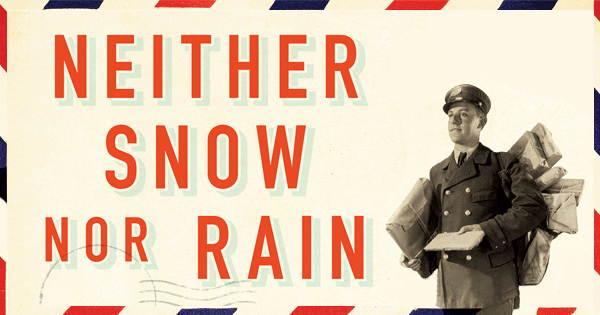Neither Snow Nor Rain
Read an excerpt from Devin Leonard’s eclectic history of the U.S. Postal Service

Every day except Sunday, the United States Postal Service delivers 509 million pieces of mail, usually by truck, but occasionally—even in 2016—by mule train, bush pilot, or shirt pocket. It out-delivers and out-paces FedEx and UPS, not to mention a slew of other national postal services from Germany and Britain to Japan.
For all that, though, the postal service is slowly dying. Devin Leonard’s new book, Neither Snow Nor Rain, is both a history of and an entreaty to save the postal service, which, in the words of former postmaster general Lawrence O’Brien, created “a chain of paper that transported the elements of Americanism through thousands of miles, across mountains and desert, from city to frontier.”
The USPS seems from the outside like a listless bureaucracy, full of people who have gravitated there for security, not because they are consumed with ambition. “Nobody aims to be a postal worker,” says Orlando Gonzalez, a letter carrier and union organizer in New York. “That’s not someone’s goal. But I know countless people that have come here and stayed.” It can be an insular place, suspicious of people and ideas from outside.
But fascinating people have passed through its ranks. Benjamin Franklin, America’s first postmaster general, was only one of them. Long before Abraham Lincoln was president of the United States, he was the postmaster of New Salem, Illinois. Harry Truman held the title of postmaster of Grandview, Missouri. Walt Disney was a substitute carrier in Chicago. Bing Crosby was a clerk in Spokane, Washington. Rock Hudson delivered mail in Winnetka, Illinois. The mercurial jazz bassist and composer Charles Mingus toiled anonymously in post offices in Los Angeles and San Francisco before becoming famous in the 1950s. Four decades later, the USPS honored Mingus with his own stamp, but neglected to mention he was a former employee.
Some famous postal workers didn’t care for the job. The novelist William Faulkner, author of classics like The Sound and the Fury and As I Lay Dying, spent three years as postmaster at the University of Mississippi until he was fired in 1924 for his obvious disinterest. A postal inspector furnished him with a long list of his transgressions, which included treating patrons rudely, failing to forward mail, and writing the greater part of one of his books while he was on duty. The scabrous author Charles Bukowski worked for the postal service as a substitute carrier. In his 1971 novel Post Office, Bukowski depicted the job in nightmarish terms. “Every route had its traps and only the regular carriers knew of them,” he wrote. “Each day it was another god damned thing, and you were always ready for a rape, murder, dogs, or insanity of some sort. The regulars wouldn’t tell you their secrets.”
Neither Snow Nor Rain: A History of the United States Postal Service copyright © 2016 by Devin Leonard; used with the permission of the publisher, Grove Press, an imprint of Grove Atlantic, Inc.

